Learning 222+ essential Russian words and phrases is a key step for anyone looking to improve their language skills. This list includes not just basic words, but also phrases that show how Russians really talk. This helps you understand everyday conversations better. Language is crucial for getting to know any culture, so knowing these basics is really important if you want to connect with Russian speakers. What’s exciting is seeing how these words and phrases can open up new chances for you, both personally and professionally.
Importance of Learning Basic Russian Words and Phrases
Learning some basic Russian words and phrases is key when you start learning the language. It helps you communicate better and understand more. You’ll feel more confident and get more out of everyday situations. Plus, it sets you up to improve your skills even further.
Common Russian Words for Beginners
Greetings and Departures
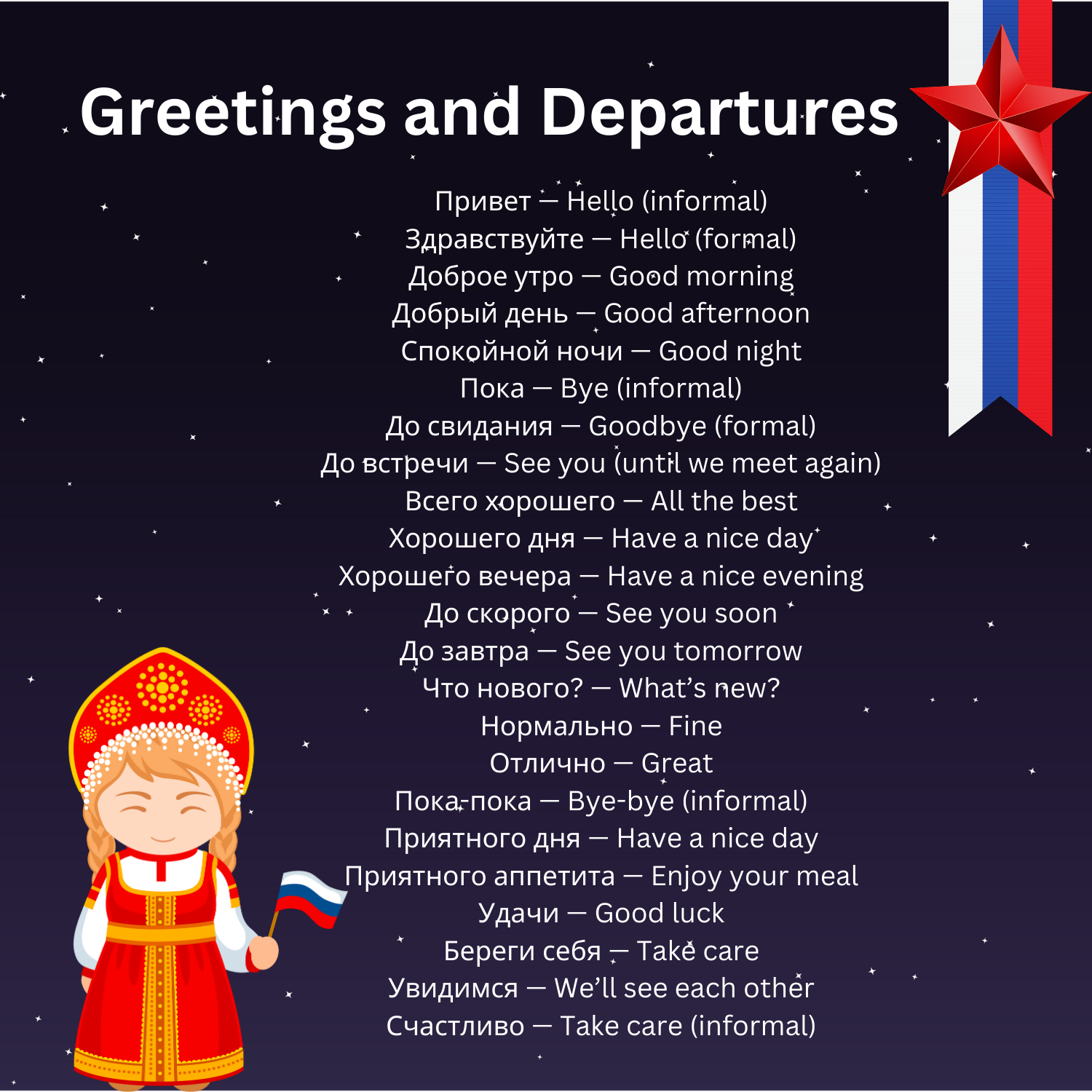
Knowing simple Russian greetings and goodbyes is key if you’re in Russia. For example, ‘Привет’ means ‘Hello’ and is casual. ‘До свидания’ means ‘Goodbye.’
Using these phrases can make daily conversations easier, especially if you’re new to the language. So, when you’re around, try them out; it’ll help a lot.
| Russian Phrase | English Translation |
|---|---|
| Привет | Hello (informal) |
| Здравствуйте | Hello (formal) |
| Доброе утро | Good morning |
| Добрый день | Good afternoon |
| Спокойной ночи | Good night |
| Пока | Bye (informal) |
| До свидания | Goodbye (formal) |
| До встречи | See you (until we meet again) |
| Всего хорошего | All the best |
| Хорошего дня | Have a nice day |
| Хорошего вечера | Have a nice evening |
| До скорого | See you soon |
| До завтра | See you tomorrow |
| Что нового? | What’s new? |
| Нормально | Fine |
| Отлично | Great |
| Пока-пока | Bye-bye (informal) |
| Приятного дня | Have a nice day |
| Приятного аппетита | Enjoy your meal |
| Удачи | Good luck |
| Береги себя | Take care |
| Увидимся | We’ll see each other |
| Счастливо | Take care (informal) |
Also Read: How To Say “Hello” In Russian: 33 Unique Russian Greetings
Basic Expressions of Politeness
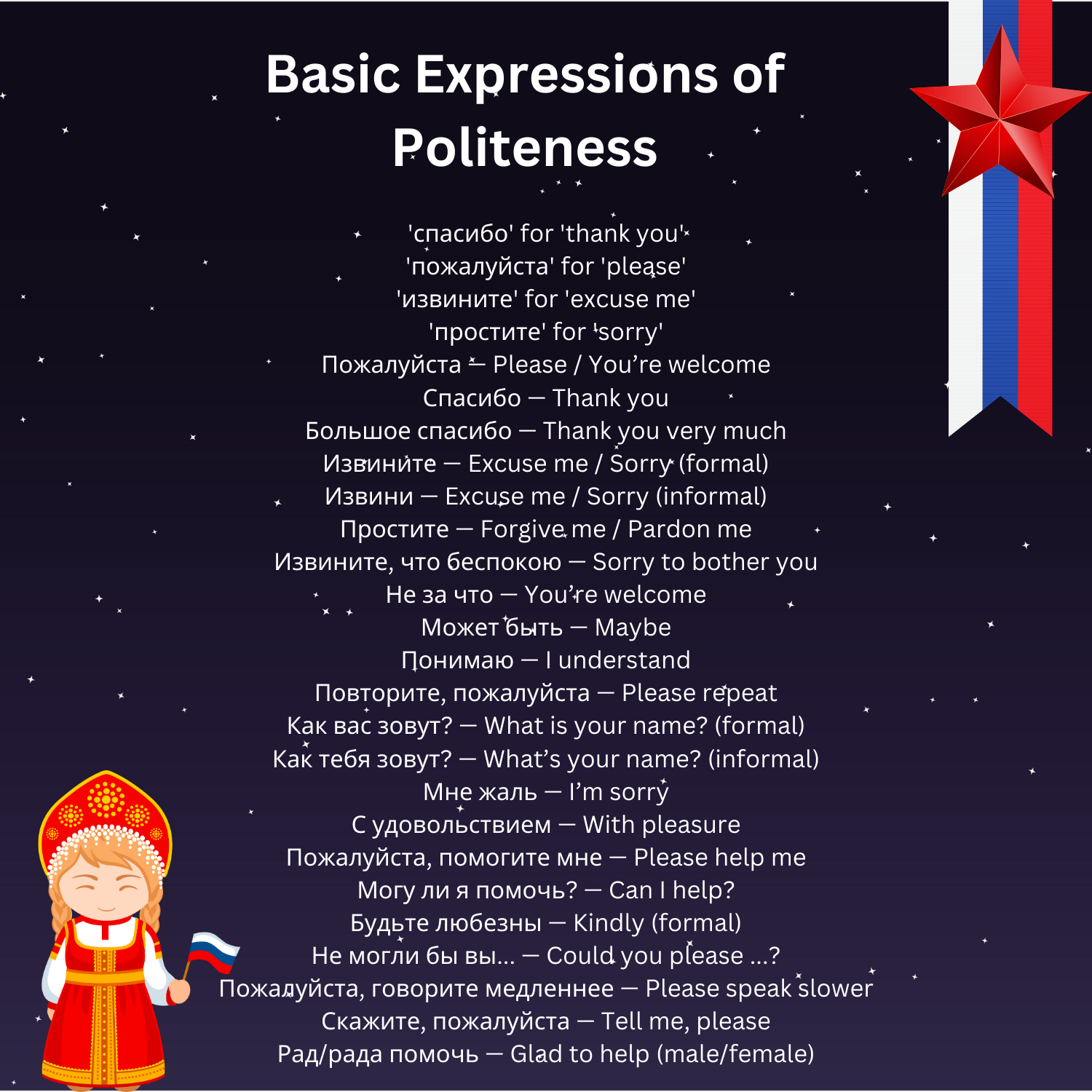
Knowing simple polite phrases in Russian can really help you connect with native speakers.
Important words include:
| Russian Phrase | English Translation |
|---|---|
| спасибо | thank you |
| пожалуйста | please |
| извините | excuse me |
| простите | sorry |
When you use these words, it shows respect and helps you get along better in Russian social situations.
| Russian Phrase | English Translation |
|---|---|
| Пожалуйста | Please / You’re welcome |
| Спасибо | Thank you |
| Большое спасибо | Thank you very much |
| Извините | Excuse me / Sorry (formal) |
| Извини | Excuse me / Sorry (informal) |
| Простите | Forgive me / Pardon me |
| Извините, что беспокою | Sorry to bother you |
| Не за что | You’re welcome |
| Может быть | Maybe |
| Понимаю | I understand |
| Повторите, пожалуйста | Please repeat |
| Как вас зовут? | What is your name? (formal) |
| Как тебя зовут? | What’s your name? (informal) |
| Мне жаль | I’m sorry |
| С удовольствием | With pleasure |
| Пожалуйста, помогите мне | Please help me |
| Могу ли я помочь? | Can I help? |
| Будьте любезны | Kindly (formal) |
| Не могли бы вы… | Could you please…? |
| Пожалуйста, говорите медленнее | Please speak slower |
| Скажите, пожалуйста | Tell me, please |
| Рад/рада помочь | Glad to help (male/female) |
Also Read: How To Say “Thank You” In Russian? 45 Unique Ways To Say It
Common Daily Words and Phrases
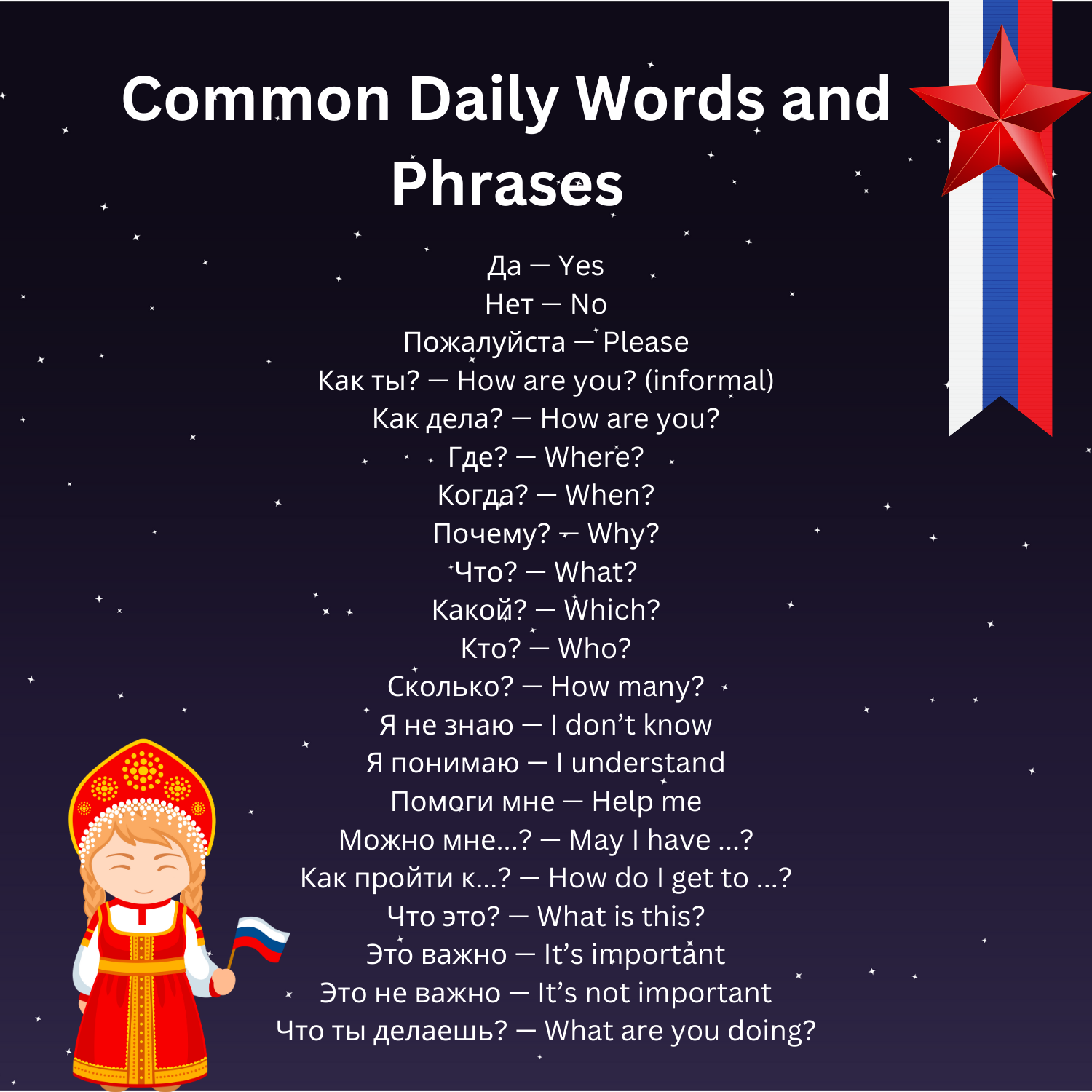
Let’s build on simple courtesies and delve into daily Russian phrases that are good for beginners. Start by saying ‘Привет’ for Hello. When sharing feelings, use ‘Любовь’ for Love and ‘Радость’ for Happiness. And for pets, say ‘Кошка’ for Cat and ‘Собака’ for Dog. These basic words will help you start talking in Russian.
| Russian Phrase | English Translation |
|---|---|
| Да | Yes |
| Нет | No |
| Пожалуйста | Please |
| Как ты? | How are you? (informal) |
| Как дела? | How are you? |
| Где? | Where? |
| Когда? | When? |
| Почему? | Why? |
| Что? | What? |
| Какой? | Which? |
| Кто? | Who? |
| Сколько? | How many? |
| Я не знаю | I don’t know |
| Я понимаю | I understand |
| Помоги мне | Help me |
| Можно мне…? | May I have…? |
| Как пройти к…? | How do I get to…? |
| Что это? | What is this? |
| Это важно | It’s important |
| Это не важно | It’s not important |
| Что ты делаешь? | What are you doing? |
Essential Russian Phrases for Beginners
Introductions and Personal Details
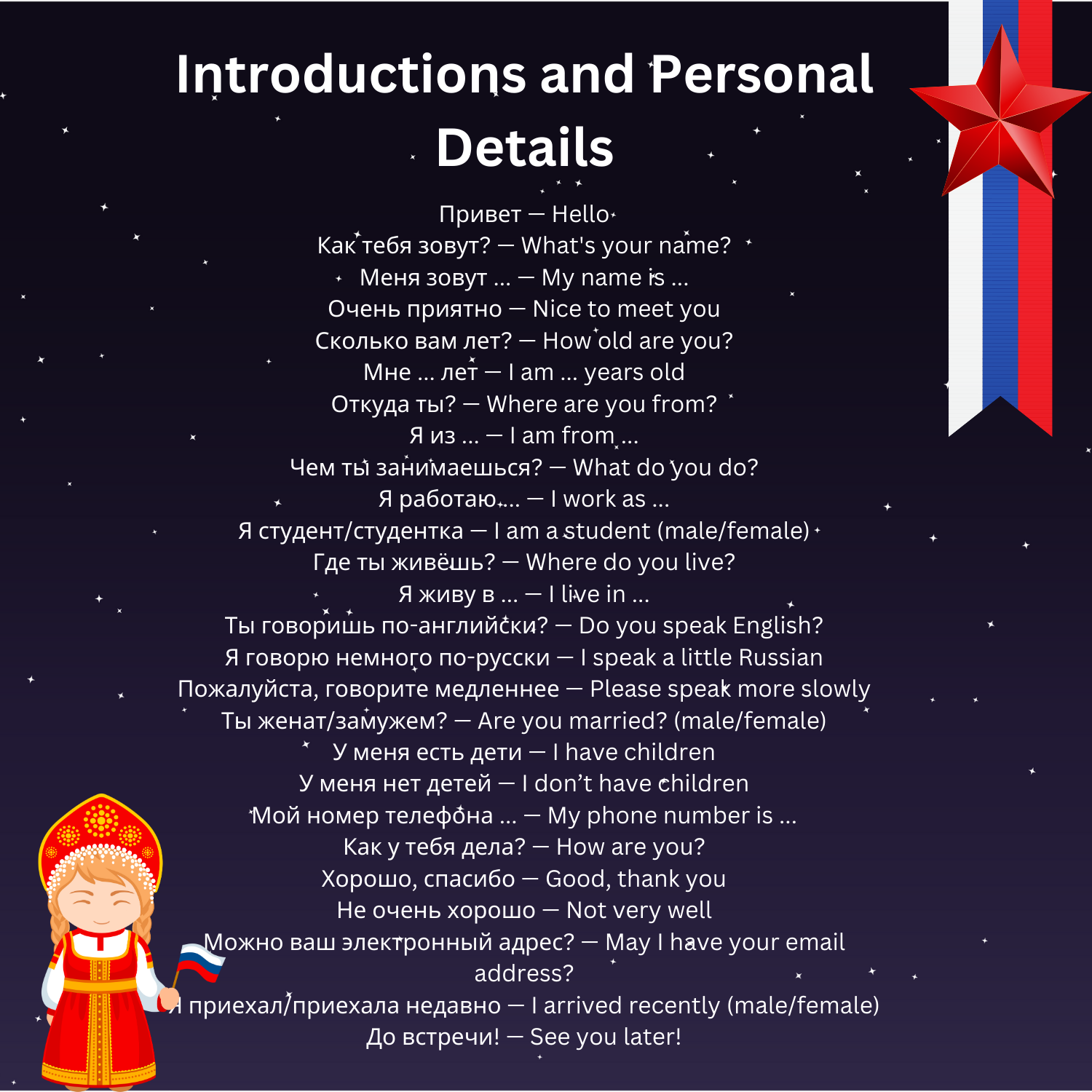
Learning key phrases for introductions and personal details is crucial for beginners in Russian.
Start with simple questions such as ‘Как Вас зовут?’ which means ‘What is your name?’ or ‘Откуда Вы?’, translating to ‘Where are you from?’.
These phrases help you start conversations smoothly and build connections.They lay a strong base for more communication.
| Russian Phrase | English Translation |
|---|---|
| Привет | Hello |
| Как тебя зовут? | What’s your name? |
| Меня зовут … | My name is … |
| Очень приятно | Nice to meet you |
| Сколько вам лет? | How old are you? |
| Мне … лет | I am … years old |
| Откуда ты? | Where are you from? |
| Я из … | I am from … |
| Чем ты занимаешься? | What do you do? |
| Я работаю … | I work as … |
| Я студент/студентка | I am a student (male/female) |
| Где ты живёшь? | Where do you live? |
| Я живу в … | I live in … |
| Ты говоришь по-английски? | Do you speak English? |
| Я говорю немного по-русски | I speak a little Russian |
| Пожалуйста, говорите медленнее | Please speak more slowly |
| Ты женат/замужем? | Are you married? (male/female) |
| У меня есть дети | I have children |
| У меня нет детей | I don’t have children |
| Мой номер телефона … | My phone number is … |
| Как у тебя дела? | How are you? |
| Хорошо, спасибо | Good, thank you |
| Не очень хорошо | Not very well |
| Можно ваш электронный адрес? | May I have your email address? |
| Я приехал/приехала недавно | I arrived recently (male/female) |
| До встречи! | See you later! |
Asking for Help and Directions
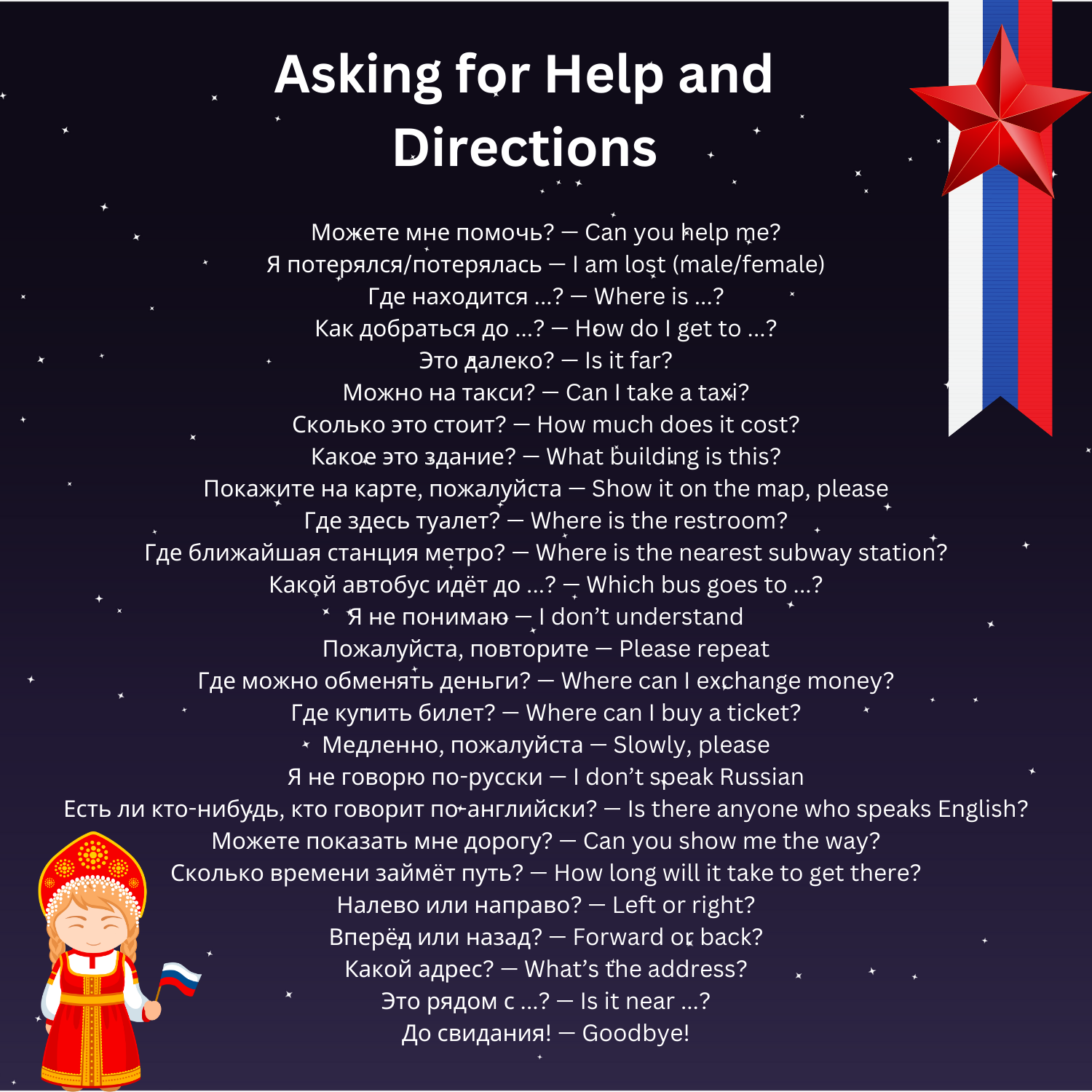
Navigating Russia gets easier when you master some key phrases for asking for help and directions. Remember these:
‘Помогите!’ means ‘Help!’ This is good to shout if you’re in trouble.
‘Где находится…?’ translates to ‘Where is…?’ It’s useful when you’re looking for a place.
‘Как пройти к…?’ means ‘How do I get to…?’ Use this to find your way around.
Knowing these will help you move through cities, get help when needed, and talk to locals more smoothly.
| Russian Phrase | English Translation |
|---|---|
| Можете мне помочь? | Can you help me? |
| Я потерялся/потерялась | I am lost (male/female) |
| Где находится …? | Where is …? |
| Как добраться до …? | How do I get to …? |
| Это далеко? | Is it far? |
| Можно на такси? | Can I take a taxi? |
| Сколько это стоит? | How much does it cost? |
| Какое это здание? | What building is this? |
| Покажите на карте, пожалуйста | Show it on the map, please |
| Где здесь туалет? | Where is the restroom? |
| Где ближайшая станция метро? | Where is the nearest subway station? |
| Какой автобус идёт до …? | Which bus goes to …? |
| Я не понимаю | I don’t understand |
| Пожалуйста, повторите | Please repeat |
| Где можно обменять деньги? | Where can I exchange money? |
| Где купить билет? | Where can I buy a ticket? |
| Медленно, пожалуйста | Slowly, please |
| Я не говорю по-русски | I don’t speak Russian |
| Есть ли кто-нибудь, кто говорит по-английски? | Is there anyone who speaks English? |
| Можете показать мне дорогу? | Can you show me the way? |
| Сколько времени займёт путь? | How long will it take to get there? |
| Налево или направо? | Left or right? |
| Вперёд или назад? | Forward or back? |
| Какой адрес? | What’s the address? |
| Это рядом с …? | Is it near …? |
| До свидания! | Goodbye! |
Food and Drink Related Phrases
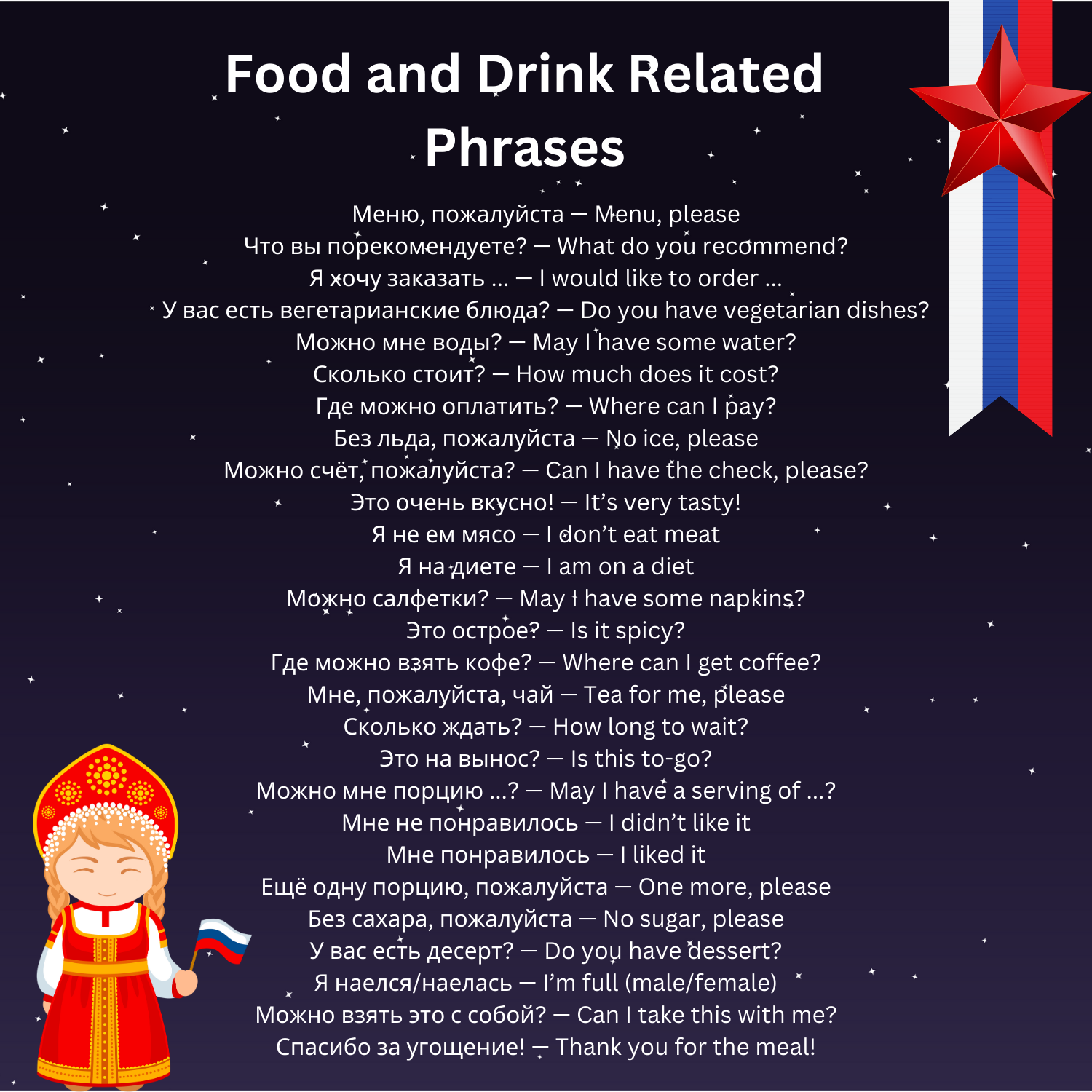
Once you know the basics for asking for help and finding your way around, diving into Russian food and drink terms can really boost your language skills. Start by learning how to order. You can say “Я хочу есть” for ‘I want to eat’ and “Я хочу пить” for ‘I want to drink.’
It’s also good to know how to ask for an English menu. Just ask “У Вас есть меню на английском?”
| Russian Phrase | English Translation |
|---|---|
| Меню, пожалуйста | Menu, please |
| Что вы порекомендуете? | What do you recommend? |
| Я хочу заказать … | I would like to order … |
| У вас есть вегетарианские блюда? | Do you have vegetarian dishes? |
| Можно мне воды? | May I have some water? |
| Сколько стоит? | How much does it cost? |
| Где можно оплатить? | Where can I pay? |
| Без льда, пожалуйста | No ice, please |
| Можно счёт, пожалуйста? | Can I have the check, please? |
| Это очень вкусно! | It’s very tasty! |
| Я не ем мясо | I don’t eat meat |
| Я на диете | I am on a diet |
| Можно салфетки? | May I have some napkins? |
| Это острое? | Is it spicy? |
| Где можно взять кофе? | Where can I get coffee? |
| Мне, пожалуйста, чай | Tea for me, please |
| Сколько ждать? | How long to wait? |
| Это на вынос? | Is this to-go? |
| Можно мне порцию …? | May I have a serving of … |
| Мне не понравилось | I didn’t like it |
| Мне понравилось | I liked it |
| Ещё одну порцию, пожалуйста | One more, please |
| Без сахара, пожалуйста | No sugar, please |
| У вас есть десерт? | Do you have dessert? |
| Я наелся/наелась | I’m full (male/female) |
| Можно взять это с собой? | Can I take this with me? |
| Спасибо за угощение! | Thank you for the meal! |
Advanced Russian Vocabulary Enhancement
Academic and Business Terms
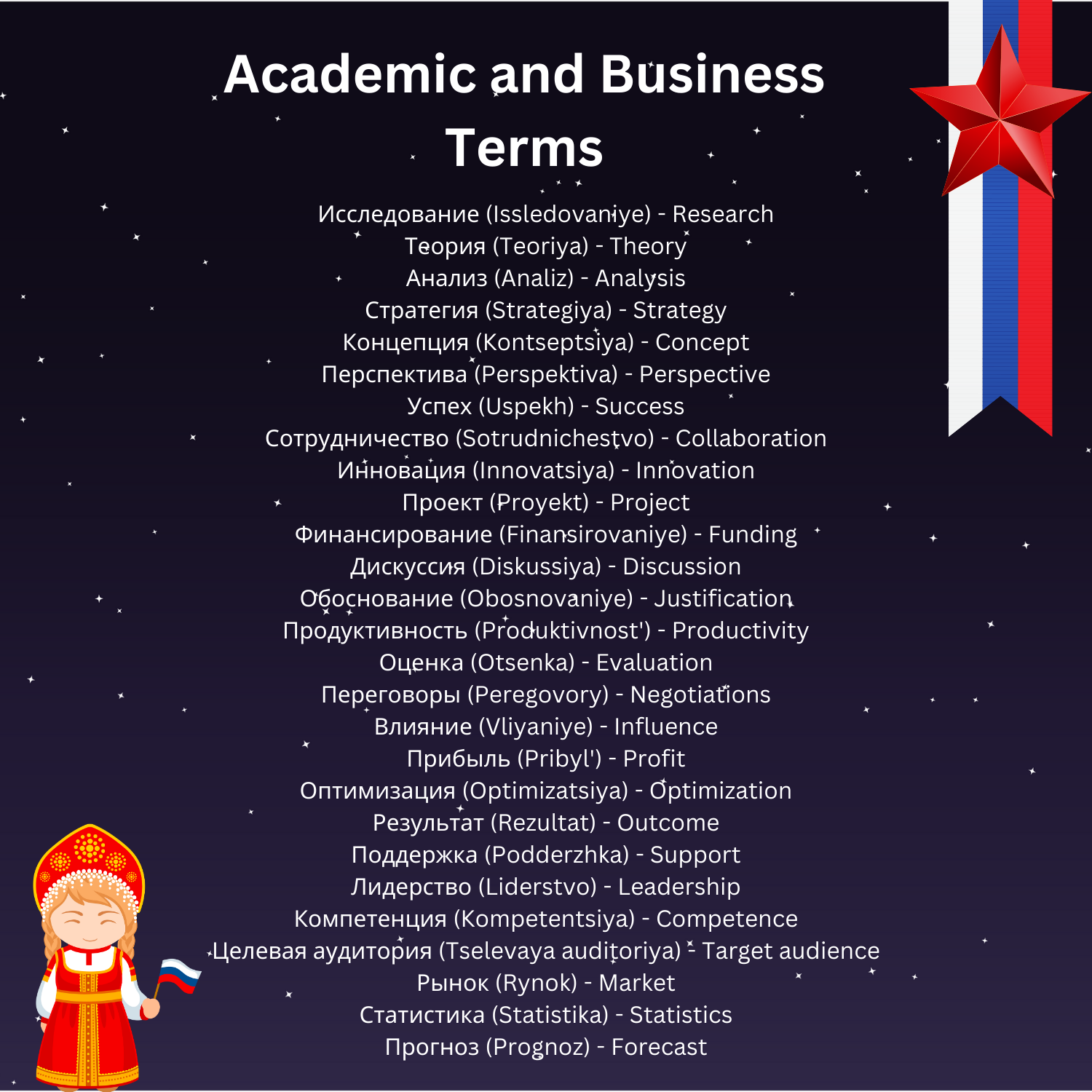
Learning advanced Russian words, especially for business and academics, is very helpful for professionals working with Russian speakers. Knowing words like ‘акционерное общество’ (joint-stock company), ‘доходность’ (yield), and ‘неустойка’ (penalty) makes business talks smoother and helps in academic teamwork. This way, you can talk clearly and effectively.
| Russian Term | English Translation |
|---|---|
| Исследование (Issledovaniye) | Research |
| Теория (Teoriya) | Theory |
| Анализ (Analiz) | Analysis |
| Стратегия (Strategiya) | Strategy |
| Концепция (Kontseptsiya) | Concept |
| Перспектива (Perspektiva) | Perspective |
| Успех (Uspekh) | Success |
| Сотрудничество (Sotrudnichestvo) | Collaboration |
| Инновация (Innovatsiya) | Innovation |
| Проект (Proyekt) | Project |
| Финансирование (Finansirovaniye) | Funding |
| Дискуссия (Diskussiya) | Discussion |
| Обоснование (Obosnovaniye) | Justification |
| Продуктивность (Produktivnost’) | Productivity |
| Оценка (Otsenka) | Evaluation |
| Переговоры (Peregovory) | Negotiations |
| Влияние (Vliyaniye) | Influence |
| Прибыль (Pribyl’) | Profit |
| Оптимизация (Optimizatsiya) | Optimization |
| Результат (Rezultat) | Outcome |
| Поддержка (Podderzhka) | Support |
| Лидерство (Liderstvo) | Leadership |
| Компетенция (Kompetentsiya) | Competence |
| Целевая аудитория (Tselevaya auditoriya) | Target audience |
| Рынок (Rynok) | Market |
| Статистика (Statistika) | Statistics |
| Прогноз (Prognoz) | Forecast |
Medical and Legal Terminology
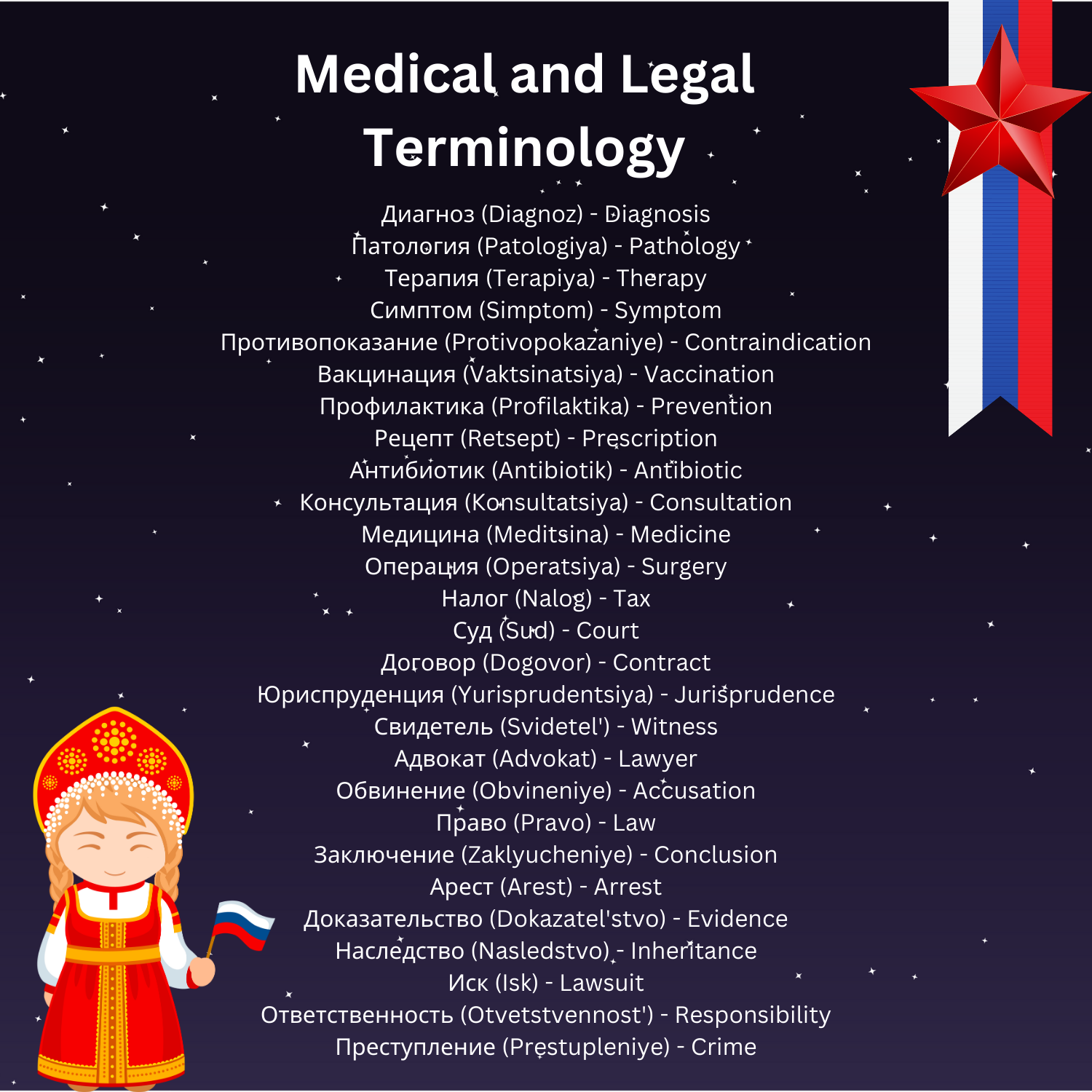
Knowing the right medical and legal terms in Russian can make a big difference in how well professionals communicate. For example, understanding words like ‘diagnosis’ and ‘investigation’ in medicine, or ‘crime’ and ‘trial’ in law, helps experts handle complicated situations better and more accurately.
When you get the hang of these terms, you can speak clearly and directly. This not only makes your job easier but also ensures that everyone involved is on the same page, avoiding misunderstandings. So, it’s really about making your communication as straightforward and effective as possible.
| Russian Term | English Translation |
|---|---|
| Диагноз (Diagnoz) | Diagnosis |
| Патология (Patologiya) | Pathology |
| Терапия (Terapiya) | Therapy |
| Симптом (Simptom) | Symptom |
| Противопоказание (Protivopokazaniye) | Contraindication |
| Вакцинация (Vaktsinatsiya) | Vaccination |
| Профилактика (Profilaktika) | Prevention |
| Рецепт (Retsept) | Prescription |
| Антибиотик (Antibiotik) | Antibiotic |
| Консультация (Konsultatsiya) | Consultation |
| Медицина (Meditsina) | Medicine |
| Операция (Operatsiya) | Surgery |
| Налог (Nalog) | Tax |
| Суд (Sud) | Court |
| Договор (Dogovor) | Contract |
| Юриспруденция (Yurisprudentsiya) | Jurisprudence |
| Свидетель (Svidetel’) | Witness |
| Адвокат (Advokat) | Lawyer |
| Обвинение (Obvineniye) | Accusation |
| Право (Pravo) | Law |
| Заключение (Zaklyucheniye) | Conclusion |
| Арест (Arest) | Arrest |
| Доказательство (Dokazatel’stvo) | Evidence |
| Наследство (Nasledstvo) | Inheritance |
| Иск (Isk) | Lawsuit |
| Ответственность (Otvetstvennost’) | Responsibility |
| Преступление (Prestupleniye) | Crime |
Alternative Expressions for Advanced Learners
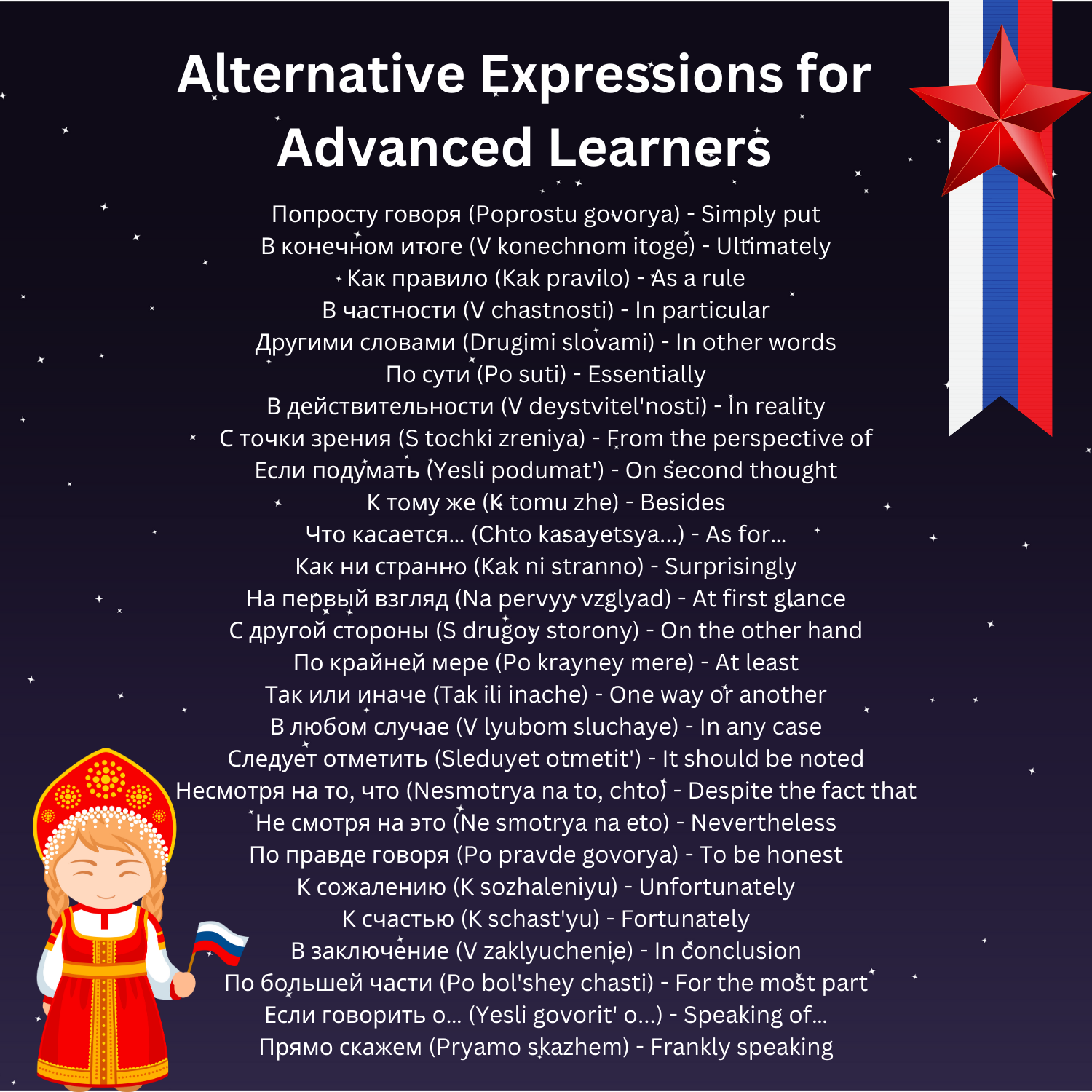
For advanced learners, it’s vital to improve your Russian by learning different ways to say things. Instead of just saying ‘плохо чувствовать себя’ for feeling unwell, try using ‘не в своей тарелке’.
This approach not only boosts your vocabulary but also makes your conversations richer. When you use varied expressions, you get a better grasp of the language and can speak more fluently. It’s all about diving deeper to really get the hang of Russian.
| Russian Phrase | English Translation |
|---|---|
| Попросту говоря (Poprostu govorya) | Simply put |
| В конечном итоге (V konechnom itoge) | Ultimately |
| Как правило (Kak pravilo) | As a rule |
| В частности (V chastnosti) | In particular |
| Другими словами (Drugimi slovami) | In other words |
| По сути (Po suti) | Essentially |
| В действительности (V deystvitel’nosti) | In reality |
| С точки зрения (S tochki zreniya) | From the perspective of |
| Если подумать (Yesli podumat’) | On second thought |
| К тому же (K tomu zhe) | Besides |
| Что касается… (Chto kasayetsya…) | As for… |
| Как ни странно (Kak ni stranno) | Surprisingly |
| На первый взгляд (Na pervyy vzglyad) | At first glance |
| С другой стороны (S drugoy storony) | On the other hand |
| По крайней мере (Po krayney mere) | At least |
| Так или иначе (Tak ili inache) | One way or another |
| В любом случае (V lyubom sluchaye) | In any case |
| Следует отметить (Sleduyet otmetit’) | It should be noted |
| Несмотря на то, что (Nesmotrya na to, chto) | Despite the fact that |
| Не смотря на это (Ne smotrya na eto) | Nevertheless |
| По правде говоря (Po pravde govorya) | To be honest |
| К сожалению (K sozhaleniyu) | Unfortunately |
| К счастью (K schast’yu) | Fortunately |
| В заключение (V zaklyuchenie) | In conclusion |
| По большей части (Po bol’shey chasti) | For the most part |
| Если говорить о… (Yesli govorit’ o…) | Speaking of… |
| Прямо скажем (Pryamo skazhem) | Frankly speaking |
Conclusion
Learning 222+] basic Russian words and phrases really helps improve your language skills and understanding of the culture. This knowledge makes talking and connecting easier and also helps you really get Russian customs and social norms. So, if you’re looking to communicate better and more deeply in various situations — whether personal, for school, or work — adding to your Russian vocabulary is key. Keep visiting the Translation Blog to master any language easily.

